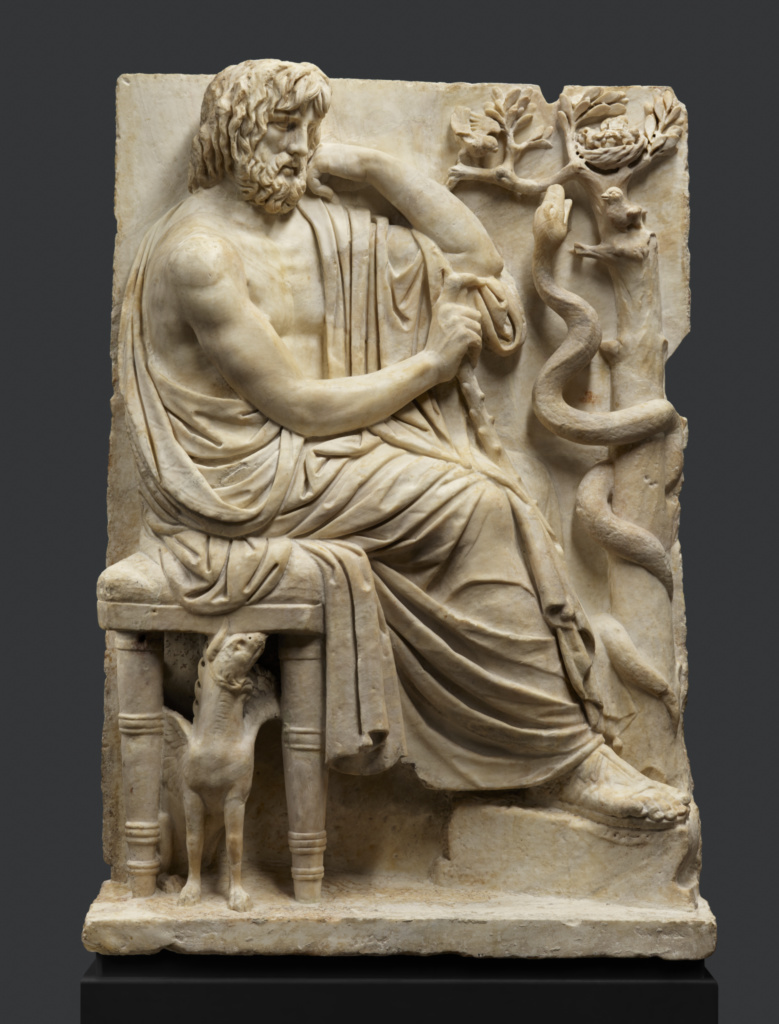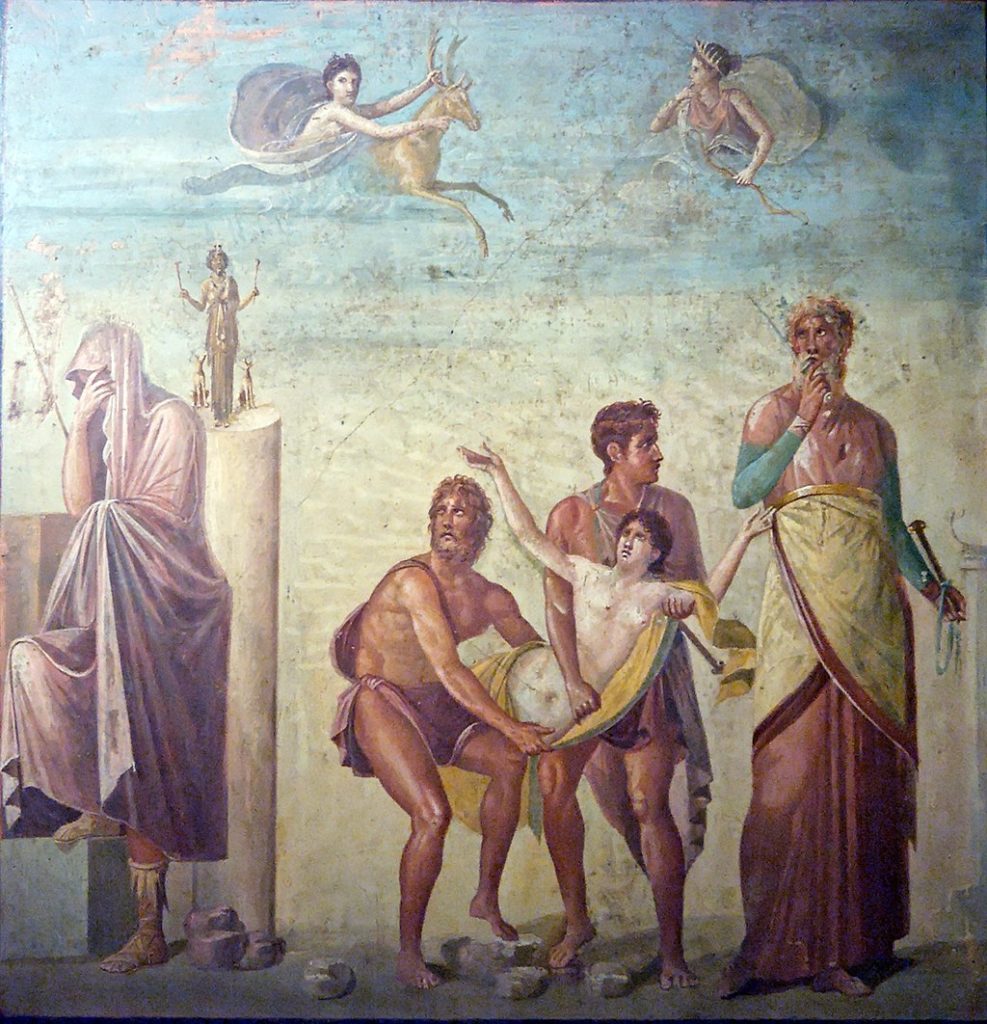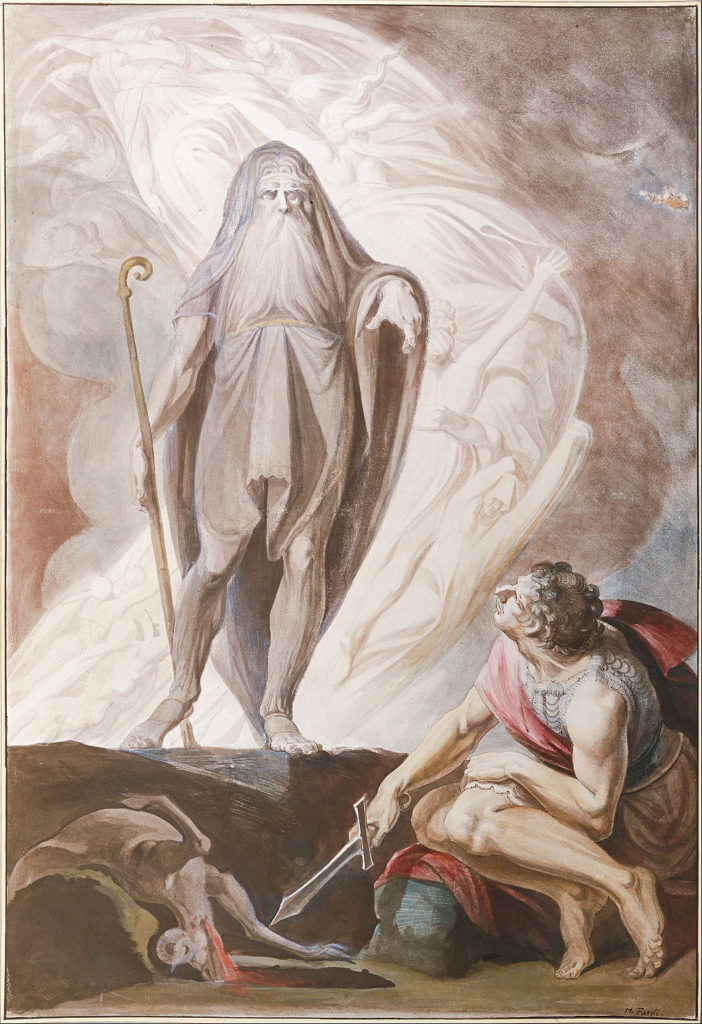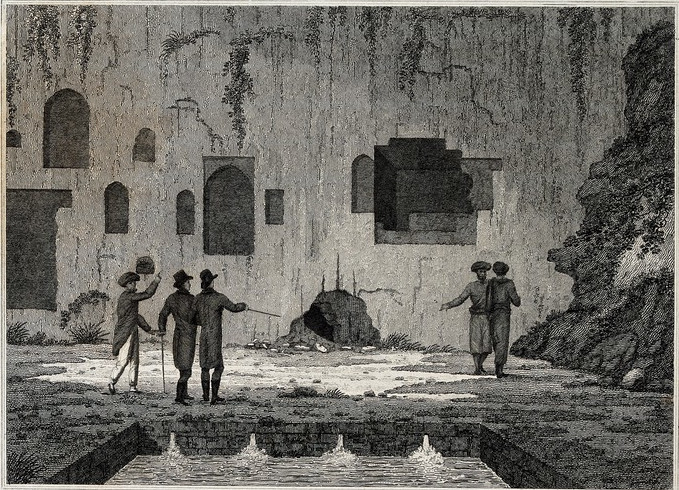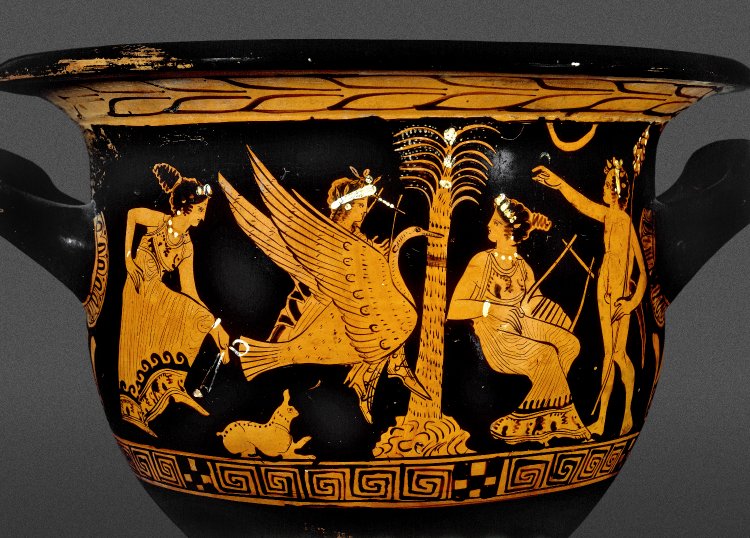This latest post about Core Vocabulary terms from The Ancient Greek Hero in 24 Hours[1] and the associated Sourcebook[2] is mantis [μάντις], glossed as “seer, prophet”.
There are other words for this function which also feature in some of these passages; these are listed at the end.
In the Iliad the mantis Kalkhas makes an appearance, when Achilles summons an assembly to try and resolve the plague that has been besetting the Achaean camp.
…fleet Achilles rose and spoke among them.
“Son of Atreus,” said he, “I deem that we should now [60] turn roving home if we would escape destruction, for we are being cut down by war and pestilence at once. Let us ask some priest [hiereus] or prophet [mantis], or some reader-of-dreams [oneiropolon] (for dreams, too, are of Zeus) who can tell us why Phoebus Apollo is so angry, and say [65] whether it is for some vow that we have broken, or hecatomb that we have not offered, and whether he will accept the savor of lambs and goats without blemish, so as to take away the plague from us.”
With these words he sat down, and Kalkhas son of Thestor, best [aristos] of seers [oneiropolon], [70] who knew things past present and to come, rose to speak. He it was who had guided the Achaeans with their fleet to Ilion, through the prophecies [mantosunē] with which Phoebus Apollo had inspired him.
Iliad 1.58–72, adapted from Sourcebook[3]
When Kalkhas explains the reason for the plague, Agamemnon is not pleased:
His heart was black with rage, and his eyes flashed fire [105] as he scowled at Kalkhas and said, “Seer [mantis] of evil, you never yet prophesied [manteuesthai] good things concerning me, but have always loved to foretell that which was evil. You have brought me neither comfort nor performance; and now you come prophesying [theopropein] among the Danaans, and saying [110] that Apollo has plagued us because I would not take a ransom [apoina] for this girl, the daughter of Khrysēs.
Iliad 1.103–113, adapted from Sourcebook
Part of the reason for Agamemnon’s anger toward Kalkhas goes back to the beginning of the expedition.
Then the wise seer [mantis] of the army, seeing that the two warlike sons of Atreus were twins in character, recognized the devourers of the rabbit and |125 the leaders of the expedition already underway, [that they were the same,] and this is the way [houtō] he spoke, speaking the language of omens [terazein]: “In due time this expedition, set in motion, will capture the city of Priam as its prey, and, at the ground level of that city’s towered walls, all the plentiful herds of the community |130 will be ravaged most violently by fate [Moira]. The only thing to guard against is this: may it not happen that some resentment [agā] sent by the gods may cloud over and ruin the mighty bit forged for Troy’s mouth by the army. I say this because she, in her pity, is angry. I mean, holy [hagnā] Artemis. She is angry |135 at the winged hunting dogs of her father [Zeus], for they are sacrificing [thuein] a miserable frightened thing, together with her offspring that were ready to be born, before she has brought them forth. She [Artemis] has a loathing for the feast of the eagles.”
Aeschylus Agamemnon 122–138, Sourcebook
The Epic Cycle provides another detail about his role as the expedition went underway:
{p104} 1 After this the leaders come together at Aulis to sacrifice. The happenings
2 concerning the snake and the sparrows are described.
3 Kalkhas foretells the future events for them.
… 12 The expedition gathers at Aulis for the second time.
13 Agamemnon kills a deer on the hunt and boasts that he surpasses
14 even Artemis. The goddess gets mēnis and holds them back
15 from the voyage by sending them bad weather. But Kalkhas explains
16 the mēnis of the goddess and tells them to sacrifice Iphigeneia to Artemis.Epic Cycle, Proclus’ Summary of the Cypria, attributed to Stasinus of Cyprus, Sourcebook
Euripides tells this story in Iphigenia in Aulis; the excuse for bringing Iphigeneia to Aulis is under the pretext of marrying Achilles, but he is reluctant to be party to this:
Kalkhas, the seer [mantis], shall rue beginning the sacrifice with his barley-meal and lustral water. Why, what is a seer [mantis]? A man who with luck tells the truth [alēthē] sometimes, with frequent falsehoods, but when his luck deserts him, collapses then and there.
Euripides Iphigeneia in Aulis 955–958, adapted from translation by E.P. Coleridge[4]
We also see that Kalkhas is associated with another seer, Teiresias:
22 Meanwhile, those who followed Kalkhas and Leonteus and
23 Polypoites travel by land to Kolophon, and
24 they arrange a funeral for Teiresias, who died there.Epic Cycle, Proclus’ Summary of the Nostoi, attributed to Agias of Trozen, {p108} 22–24, Sourcebook
We see Teiresias as a seer in some of the tragedies set in Thebes. In Oedipus Tyrannus the Chorus describes him:
I know that our lord Teiresias is the seer most like our 285 lord Apollo; from him, my lord, an investigator might learn most clearly about these affairs.
Sophocles Oedipus Tyrannus 284–286, Sourcebook
But the Chorus, like Achilles above, also casts doubt on the abilities of Teiresias:
Zeus and Apollo indeed are perceptive [sunetoi] and know the affairs of the earth. 500 But there is no true test [alēthēs krisis] of whether a mortal mantis attains more knowledge than I do, though man may surpass man in wisdom [sophiā].
Sophocles Oedipus Tyrannus 496– 501, Sourcebook
After his death Teiresias still has the ability to see and interpret even in Hades.
|492 and there you all will consult [khrē-] the spirit [psūkhē] of Teiresias of Thebes, |493 the blind seer [mantis], whose thinking [phrenes] is grounded [empedoi]: |494 to him, even though he was dead, Persephone gave consciousness [noos], |495 so as to be the only one there who has the power to think [pepnusthai].
Odyssey 10.492–495, Sourcebook
|95 Stand back from the trench and draw back your sharp sword |96 so that I may drink of the blood and tell you unmistakably true things.” |97 So he spoke, and I [= Odysseus] drew back, and sheathed my silver-studded sword, |98 putting it back into the scabbard, and then he [= Teiresias], after he had drunk the black blood, |99 began to address me with his words, faultless seer [mantis] that he was:
Odyssey 11.95–99, Sourcebook
In Hades, Teiresias needs do nothing except drink the blood from the sacrifice.
Seers may act in other ritual situations, although without the need to drink the blood of the sacrificed animal! Pausanias provides an example of how seers act in conjunction with a cult hero during a consultation:
When a man decides to descend [kat-ienai] to the place of Trophōnios, first of all he undergoes a regimen for a set number of days in a dwelling [oikēma], and the dwelling [oikēma] is sacred to Good Superhuman Force [Agathos Daimōn] and to Good Fortune [Agathē Tukhē]. In undergoing the regimen there, he goes through various procedures of purification, avoiding hot baths; the water for bathing is the river Hercyna. He has unlimited access to meat from the sacrifices, for he who descends [kat-ienai] makes sacrifices to Trophōnios himself and to the children of Trophōnios; also to Apollo and to Kronos, to Zeus with the epithet King [Basileus], to Hera Charioteer [Hēniokhos = the one who holds the reins of the chariot], and to Demeter whom they name with the epithet Europa, saying that she was the wetnurse of Trophōnios. |9.39.6 At each of the sacrifices a seer [mantis] is present, who inspects the entrails of the sacrificial victim, and after an inspection makes prophecies to him who descends [kat-ienai], saying whether Trophōnios will be of good intentions [eu-menēs] and will be welcoming when he receives [verb dekhesthai] him.
Pausanias 9.39.5–9.39.6, Sourcebook
Gregory Nagy explains further:
manteîon, ‘oracle’, in Pausanias 9.39.5, 9.39.7, 9.39.8, and 9.39.9: The place where the initiand is actually initiated into the mysteries of the cult hero Trophōnios is technically an ‘oracle’. As we see from the formation of the word manteîon, it is a place where one consults a mantis, ‘seer’, who is in charge of communications from the superhuman force that presides over the sacred space writ large. In the description given by Pauasanias about the manteîon of Trophōnios, we see that there is in fact a mantis, ‘seer’, present ‘at each of the sacrifices’ (9.39.6).
H24H 15§38
He explains further:
consulting of oracular cult heroes concerns not only the fundamentals of nature as defined metonymically by these heroes. It concerns also the fundamental nature of the heroes themselves. Their heroic essence has two aspects, one of which is defined by epic narrative traditions, while the other is defined by hero cult. In the Hērōikos of Philostratus, these two aspects of the hero are treated holistically as integral parts of a single concept. Thus the process of consulting oracular heroes leads to the initiand’s knowledge about their epic aspects, not only about their ritual aspects as oracles. As the Ampelourgos declares, cult heroes have their own knowledge of epic narrative because they are endowed with mantikē sophia, ‘the skill of a seer [mantis]’, and there is an ‘oracular’ principle, khrēsmōdes, operating within them (7.3–4). That is why, as we saw in Hour 14 Text B, a hero like Protesilaos ‘sees all the way through’, di-horâi, the poems of Homer (7.5), knowing things that go beyond his own experiences when he, Protesilaos, had lived in the past of heroes (7.5–6); the hero even knows things about which Homer himself did not sing (7.5).
So, the Hērōikos of Philostratus provides a model of poetic inspiration that centers on the superhuman consciousness of the oracular hero, which has a totalizing control of epic narrative. As we shall now see, this model is not an innovation but an archaism, stemming from oral poetic traditions that predate even the Homeric traditions of the Iliad and Odyssey.
H24H 15§54–55 commenting on the Hērōikos of Philostratus
In other day-to-day situations, seers need to read signs. Some of these are in the form of animals or birds, as when Kalkhas interpreted the omens sent by the gods.
Aristophanes mocks this method, and the wisdom of accepting the seer’s advice:
Epops
And how shall we give wealth to mankind? This is their strongest passion.Pisthetaerus
When they consult the omens, you will point them to the richest mines, you will reveal the paying ventures to the diviner, [595] and not another shipwreck will happen or sailor perish.Epops
No more shall perish? How is that?Pisthetaerus
When the auguries are examined before starting on a voyage, some bird will not fail to say, “Don’t start! there will be a storm,” or else, “Go! you will make a most profitable venture.”Aristophanes Birds 592–597, adapted from translation by Eugene O’Neill, Jr.[5]
Ultimately the ability of seers derives from Apollo.
Apollo
I will speak with dikē before you, Athena’s great tribunal. 615 Since I am a mantis, I will not lie. I have never yet, on my throne of the mantis, said anything about a man or woman or polis, that Zeus, the father of the Olympians, did not command me to say.Aeschylus Eumenides, 614–618, Sourcebook
Athena establishes trial by jury, and Apollo backs her up, addressing the Chorus of Erinyes/Eumenides:
Apollo
I command you to stand in awe of oracles, mine and Zeus’, and not to let them be unfulfilled.Chorus
715 Although it is not your duty, you give approval to deeds of bloodshed. You as mantis will speak the words of a mantis but no longer keep them unpolluted.Aeschylus Eumenides 713–716, Sourcebook
Socrates regards his superhuman force, his daimonion, as having a prophetic ability:
…Socrates laughed in a measured way and said: [84e] “Well, well, Simmias, so I guess I am not very likely to persuade other people that I do not regard my present situation as a misfortune, if I am unable to persuade even you, and if you keep worrying whether I am at all more troubled now than I was in my earlier phase of life—and whether I am inferior to swans [kuknoi] in my prophetic [mantikē] capacity. It seems that swans, when they get the feeling that they must die, even though they were singing throughout their earlier phase of life, [85a] will now sing more and better than ever, rejoicing in the thought that they are about to go away to the god whose attendants [therapōn plural] they are. But humans, because of their fear of death, tell lies about the swans [kuknoi], claiming that swans are lamenting [thrēneîn] their own death when they sing their hearts out in sorrow. So, humans are not taking into account the fact that no bird sings when it is hungry or cold or experiences some other such pain—not even the nightingale herself or the swallow or the hoopoe. All these birds are said to be singing in their sorrow because they have something to lament. But I do not believe that these birds sing because of some sorrow—and I do not believe it about the swans [kuknoi], either. [85b] Rather, as I believe, it is because swans are sacred to Apollo and have a prophetic [mantikē] capacity and foresee the good things that will happen in the house of Hādēs—that is why they sing and rejoice in that [last] day of theirs more than they ever did in the previous time of their life. And I, too, think of myself as the consecrated [hieros] agent of the same god, and a fellow temple-servant [homo-doulos] with the swans [kuknoi], and, thinking that I have received from my master [despotēs] a prophetic [mantikē] capacity that is not inferior to theirs, I would not part from life in a less happy state of mind [thūmos] than the swans.
Plato Phaedo 84d–85b, Sourcebook
There were a number of places that were particularly associated with prophecy, either with cult heroes as we have seen, or with the gods. As well as Apollo at Delphi, there was a sanctuary of Zeus at Dodona. We get a few hints about the practices there:
“King Zeus,” he [= Achilles] cried out, “lord of Dodona, god of the Pelasgoi, who dwells afar, 234 you who hold stormy Dodona in your sway, where the Selloi, [235] your seers [hupophētēs], dwell around you with their feet unwashed and their beds made upon the ground— 236 just as you heard what I was saying when I prayed to you before, 237 and did me honor by sending disaster on the Achaean people, 238 so also now grant me the fulfillment of yet a further prayer…”
Iliad 16 233–238, adapted from Sourcebook
These are just a few examples where the mantis features in the texts. What other examples have you come across? Do they specialize in one kind of seership? What kinds of practices do they undertake to access the prophetic vision, or to be able to interpret the signs? How do they deliver their prophecies, and are they believed and/or respected?
I invite members to join me in the forum to explore further the role of the mantis.
Related vocabulary
hiereus [ἱερεύς] “priest, sacrificer, diviner”
hupophētēs [ὑποφήτης] “suggester, interpreter, priest who declares an oracle”
manteion [μαντεῖον] “oracle”
manteios [μαντεῖος] “prophetic, oracular”
mantikos, mantikē [μαντικός, μαντική] “prophetic, oracular”
mantis [μάντις] “seer, prophet”
manteuma [μάντευμα] “oracle”
manteuesthai [μαντεύεσθαι] “to divine, prophesy; consult an oracle, seek divinations”
mantosunē [μαντοσύνη] “art of divination”
oneiropolon [ὀνειροπόλον] “interpreter of dreams”
terazein [τεράζειν] “interpret portents”
theopropein [θεοπροπεῖν] “to prophesy”
Notes
[1] H24H: Nagy, Gregory. 2013. The Ancient Greek Hero in 24 Hours. Harvard University Press, Cambridge, MA: 2013. Available online at the Center for Hellenic Studies.
https://nrs.harvard.edu/urn-3:hul.ebook:CHS_NagyG.The_Ancient_Greek_Hero_in_24_Hours.2013
[2] Sourcebook: The Ancient Greek Hero in 24 Hours Sourcebook of Original Greek Texts Translated into English, Gregory Nagy, General Editor. 2019.12.12. Available online at the Center for Hellenic Studies.
https://nrs.harvard.edu/urn-3:hul.ebook:CHS_NagyG_ed.Sourcebook_H24H.2013-
[3] Greek text: Homer. Homeri Opera in five volumes. Oxford, Oxford University Press. 1920. Online at Perseus.
[4] Euripides. The Plays of Euripides, translated by E. P. Coleridge. Volume II. London. George Bell and Sons. 1891. Online at Perseus.
Greek text: Euripides. Euripidis Fabulae, vol. 3. Gilbert Murray. Oxford. Clarendon Press, Oxford. 1913. Online at Perseus.
[5] Aristophanes. Birds. The Complete Greek Drama, vol. 2. Eugene O’Neill, Jr. New York. Random House. 1938. Online at Perseus.
Greek text: Aristophanes. Aristophanes Comoediae, ed. F.W. Hall and W.M. Geldart, vol. 2. F.W. Hall and W.M. Geldart. Oxford. Clarendon Press, Oxford. 1907. Online at Perseus.
Image credits
Unknown: Relief with the Seer Calchas, A.D. relief 140–160; head 170–190, Marble. 72.AA.160. The J. Paul Getty Museum, Villa Collection, Malibu, California
Open Content Program.
Fresco: Sacrifice of Iphigeneia. 1st century CE. Naples National Archaeological Museum.
Photo: Marie-Lan Nguyen. Public domain, via Wikimedia Commons
John Henry Fuseli. 1780–1785. Teiresias Foretells the Future to Odysseus.
Public domain, via Wikimedia Commons
The cave of Trophonius in Livadeia, Greece; the cavities in the rock are for votive offerings. Etching by Elizabeth Byrne, 1813, after E.D. Clarke. Wellcome Collection
License Attribution 4.0 International (CC BY 4.0)
Meleager Painter: red-figure bell krater. c 400–350 BCE. Includes Apollo riding on a swan.
© The Trustees of the British Museum Creative Commons Attribution-NonCommercial-ShareAlike 4.0 International (CC BY-NC-SA 4.0) license
Note: Images have been selected from pictures that are freely available with open source or Creative Commons licenses or from photographs sent in by community members for the purpose. The images in this post are intended to suggest the subject, rather than illustrate exactly—as such, they may be from other periods, subjects, or cultures. Attributions are based where possible by those shown by museums, or on Wikimedia Commons, at the time of publication on this website.
Images and online texts accessed March 2020.
____
Sarah Scott has a degree in Language from the University of York where she specialized in philology, and has worked as an editor, technical author, and documentation manager. She is the Executive Producer for the HeroesX project, and one of the Executive Editors of the HeroesX Sourcebook. She is an active participant and member of the editorial team in Kosmos Society, with a particular interest in content development, document management, word studies, language learning, comparative linguistics, and digital humanities.
